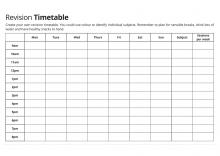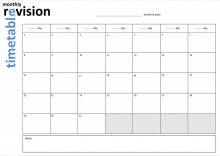
Revision is absolutely essential in order to succeed in your exams. Here are some questions you might want to ask yourself and some ideas to help make the most of your revision.
What should I revise?
- It’s really important that you plan your work carefully around the topics you need to focus on.
- Being aware that you have gaps in your knowledge can create nerves but having a plan of how you will fill these will make you feel better. To do this you will need to get an overview of each subject and then the topics within them.
- Find out what is involved in the exam: when and where will it take place? How much time is allowed? How many questions do you need to answer?
When should I revise?
- Creating a revision timetable is the best way to organise when you should revise. You should try to space out your subjects and revisit them regularly – people remember more when they repeatedly practise the same thing with a few days in between. Below is a link to a weekly and monthly timetable to help you create a revision timetable. Alternatively, you can create an electronic plan through the following website which offers a free revision planning tool: https://getrevising.co.uk/planner
- Short bursts of revision (30 – 40 minutes) are most effective – they help you to learn a little bit at a time. Concentration begins to go after about an hour, but taking short breaks can help improve your concentration for the next burst of revision.
- Don’t stay up all night revising; being overtired will not help you to do your best. You should aim to get at least 7 hours of quality sleep per night – preferably more!
- Allow yourself some fun time each day to relax – a good balance is key!
- Eating and drinking is an important part of a good revision strategy – your brain cells need energy to function well. Make sure you drink plenty of water to avoid becoming dehydrated. Dehydration makes you tired and reduces concentration.
Where should I revise?
- Try to find a quiet place to study and make sure you are sitting comfortably, have a table/desk that is well lit, and that background noise is at a minimum.
- Avoid studying in an area where there will be lots of distractions and try to have everything you need to do your revision to hand before you start.
How should I revise?
- Everyone revises in a slightly different way. As long as the method you choose helps you to remember key information, recall necessary knowledge and skills and apply them, then you’re doing the right things! The ‘Exam Preparation and Revision Guide’ below, has lots of practical revision ideas for you to try so that you can find the set of strategies that best work for you.
 |
|
|
| 2021/22 Examination Preparation & Revision Guide | Blank Weekly Revision Timetable | Blank Monthly Revision Timetable |


